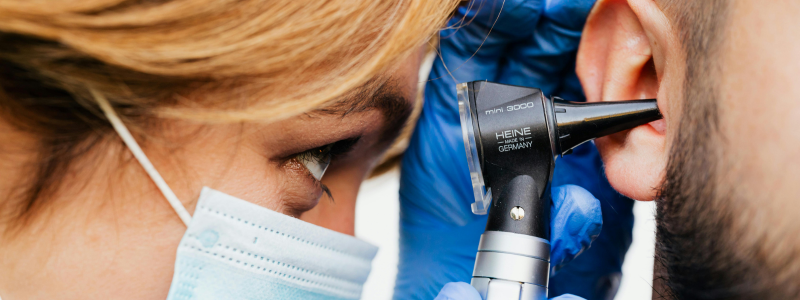
Head of Online Medical Content

Audiology Expert

Hearing Loss and Dementia Risk
The Link Between Hearing Loss and Dementia: Risk factors, research, and prevention
Overview | The links | Types of hearing loss that may affect cognitive decline | Treatment that can help | The links between dementia and hearing loss | The studies | Summary
Last Hearing Aid UK Update:
Overview
Untreated hearing loss significantly increases the risk of dementia, with both peripheral and central hearing loss contributing to cognitive decline. Early intervention, like using hearing aids, can help reduce this risk by improving cognitive function and slowing memory decline.
Social isolation due to hearing difficulties may also heighten the risk. Early detection and treatment are important for protecting cognitive health.
Is there a link between hearing loss and dementia?
Absolutely - and it’s stronger than many people realise. Research increasingly supports that untreated hearing loss may significantly raise the risk of developing dementia.
While hearing loss itself is not a definitive sign of dementia, it’s now considered one of the most modifiable risk factors.
According to the Alzheimer's Society, those who develop hearing issues in mid-life are at a higher risk of dementia.
While hearing problems can be an early symptom of dementia, having hearing loss does not guarantee a person will develop dementia, but it does increase the likelihood, especially if left untreated.
In this article, we explore how hearing loss and dementia are connected, what the research shows, and practical steps you can take to protect your cognitive health.
Key notes
- Untreated hearing loss is a leading risk factor for dementia.
- Both central and peripheral hearing loss can contribute to cognitive decline.
- Early intervention, including hearing tests and hearing aids, may reduce the risk of dementia.
- Social isolation and cognitive strain caused by hearing loss may accelerate memory problems.
Types of hearing loss that may affect cognitive decline
It is well known that people's hearing might start to decline as they age, even though it might not be as obvious at first, it often starts with struggling to hear people talking, even more so in noisy listening environments.
Due to symptoms commonly being more gradual, early detection and therefore treatment are difficult.
When we think about dementia and hearing loss, there are two predominant types - central and peripheral hearing loss. Peripheral hearing loss refers to a decreased ability of the ears to detect sounds, which can increase the risk of developing dementia.
Central hearing loss, on the other hand, involves difficulties in how the brain processes sounds. Unlike peripheral hearing loss, it cannot be corrected with hearing aids.
This type of hearing loss may be an early indicator of Alzheimer’s disease, as the brain regions responsible for sound processing are often affected in the early stages of the condition.
Can treating hearing loss reduce the risk of dementia?
If you think that your hearing has worsened, it's vital that you book a hearing test. During a hearing assessment, any hearing issues will show up on an audiogram, for an audiologist to diagnose and discuss potential causes, level of loss, and ways in which to treat and manage it.
Treatment is usually a hearing aid, personally programmed to support your unique needs. In fact, research has shown that those who wear hearing aids to manage hearing loss are less likely to develop dementia.
Hearing aid use is also linked to fewer problems with memory and thinking, even in the absence of dementia.
Long-term studies suggest that consistent use of hearing aids is associated with a slower decline in memory function over time.
Managing hearing loss is most effective when addressed early. This includes protecting your hearing from a young age by avoiding prolonged exposure to loud noise and using ear protection when needed.
What are the links between hearing loss and dementia?
Research suggests that hearing loss is linked to an increased risk of developing dementia. Both the severity of hearing loss and how long it goes untreated can influence this risk.
Hearing difficulties may also lead people to withdraw from social activities, increasing the risk of isolation and depression, both known risk factors for dementia.
When the brain has to work harder to process sounds and speech, it may strain cognitive resources, potentially leading to changes in memory and thinking abilities.
While the exact relationship between hearing loss and dementia is not fully understood, having hearing loss does not mean a person will definitely develop dementia; it simply raises the risk.
Hearing loss may be a risk factor, an early symptom of dementia, or possibly both, but it’s often difficult to determine which on a case-by-case basis.

Research on hearing loss and dementia risk
Numerous studies have explored the link between peripheral hearing loss and problems with memory, thinking, or dementia.
One major study reviewed a wide range of risk factors for dementia by comparing how often the condition develops in people with certain risk factors versus those without them.
This analysis identified hearing loss as one of the twelve leading risk factors most strongly associated with an increased risk of developing dementia.
The findings were striking: those with mild hearing loss, defined by the World Health Organisation’s (WHO) threshold, were nearly twice as likely to develop dementia compared to those with normal hearing.
The risk tripled with moderate hearing loss and was almost five times higher for those with severe hearing loss.
Even mild hearing loss has been linked to increased dementia risk and a decline in cognitive abilities. Hearing loss has been associated with faster shrinkage in brain regions involved in processing sound and memory.
Managing hearing loss early is important not just for quality of life but also for reducing the risk of dementia from hearing loss, especially in older adults.
Related reading: Mild hearing loss
Summary
Untreated hearing loss significantly increases the risk of dementia, especially in older adults. Even mild hearing loss can double the risk, with the chances rising further as severity increases.
Both ear-related and brain-related hearing loss can affect memory and thinking. Social isolation and mental strain from hearing loss may also contribute to cognitive decline.
Early treatment, like using hearing aids, can help reduce the risk and slow memory loss. Managing hearing loss is an important step in protecting long-term brain health.
Why Choose Us?
- FREE Hearing Tests
- Best Hearing Aids and Prices
- FREE Aftercare for Life
- FREE Home Visits
- 200+ Local Audiologists
- 60 Day Money Back Guarantee
Preventing hearing loss and protecting your brain
Protect your hearing, protect your brain. If you’re noticing signs of hearing loss, don’t wait; getting a hearing test is the first step in reducing your risk of dementia.
Early detection and proper treatment can make a significant difference in your cognitive health.
Book your hearing assessment today and take control of your hearing and overall well-being. Your brain will thank you.
Other hearing loss awareness articles you might like...
 Hearing aid stigma
Hearing aid stigma  How to tell if hearing loss is permanent or temporary
How to tell if hearing loss is permanent or temporary  Ways to keep your ears healthy
Ways to keep your ears healthy Our specialist service includes:
Do not spend hundreds of pounds without getting a second opinion from us.
Please call us on 0800 567 7621
 Not only are the prices great, but the service is fantastic! Many thanks to your team.
Not only are the prices great, but the service is fantastic! Many thanks to your team.What's included in our hearing aid prices?
Watch the understanding hearing loss and dementia risk video below
FAQs
In general, any audiologist will always recommend to you the hearing aid model that best suits your needs. Here is a useful checklist to make sure that is the case.
- Audiologist's level of knowledge: The audiologist you have seen will hopefully have a wide knowledge of all available hearing aids; however, some will only be familiar with a small number of brands and, therefore, may not really be in a position to know which model is the best for you. It is OK to challenge their recommendation and ask them to justify why this particular brand is the one for you.
- Do research: Read about the hearing aid that was recommended. Does it seem like it will suit your lifestyle? Does it have more or fewer features than you need?
- Be aware of sales targets: Many high street retailers have specific tie-ins to a particular manufacturer/brand. The hearing aid they have suggested may still be the correct one for you, but do your research so that you know why they might have recommended it.
If you have significant hearing loss in both ears, you should be wearing two hearing aids. Here are the audiological reasons why:
Localisation: The brain decodes information from both ears and compares and contrasts them. By analysing the minuscule time delays as well as the difference in the loudness of each sound reaching the ears, the person is able to accurately locate a sound source.
Simply put, if you have better hearing on one side than the other, you can't accurately tell what direction sounds are coming from.
Less amplification is required: A phenomenon known as “binaural summation” means that the hearing aids can be set at a lower and more natural volume setting than if you wore only one hearing aid.
Head shadow effect: High frequencies, the part of your hearing that gives clarity and meaning to speech sounds, cannot bend around your head. Only low frequencies can. Therefore, if someone is talking on your unaided side, you are likely to hear that they are speaking, but be unable to tell what they have said.
Noise reduction: The brain has its own built-in noise reduction, which is only really effective when it is receiving information from both ears. If only one ear is aided, even with the best hearing aid in the world, it will be difficult for you to hear in background noise as your brain is trying to retain all of the sounds (including background noise) rather than filtering them out.
Sound quality: We are designed to hear in stereo. Only hearing from one side sounds a lot less natural to us.
Fancy some further reading on this topic? You can read about why two hearing aids are better than one in our article, hearing aids for Both Ears, here
For most people, the main benefit of a rechargeable hearing aid is simple convenience. We are used to plugging in our phones and other devices overnight for them to charge up. Here are some other pros and cons:
For anybody with poor dexterity or issues with their fingers, having a rechargeable aid makes a huge difference, as normal hearing aid batteries are quite small and some people find them fiddly to change.
One downside is that if you forget to charge your hearing aid, then it is a problem that can't be instantly fixed. For most, a 30-minute charge will get you at least two or three hours of hearing, but if you are the type of person who is likely to forget to plug them in regularly, then you're probably better off with standard batteries.
Rechargeable aids are also a little bit bigger and are only available in Behind-the-Ear models.
Finally, just like with a mobile phone, the amount of charge you get on day one is not going to be the same as you get a few years down the line. Be sure to ask what the policy is with the manufacturer's warranty when it comes to replacing the battery.
For most people, the answer is yes. But it's never that simple.
The majority of hearing problems affect the high frequencies a lot more than the low ones. Therefore, open fitting hearing aids sound a lot more natural and ones that block your ears up can make your own voice sound like you are talking with your head in a bucket. Therefore, in-ear aids tend to be less natural.
However, the true answer is we can't tell until we have had a look in your ears to assess the size of your ear canal, and until we have tested your hearing to see which frequencies are being affected.
People with wider ear canals tend to have more flexibility, also there are open fitting modular CIC hearing aids now that do not block your ears.
There is also the age-old rule to consider, that a hearing aid will not help you if it's sat in the drawer gathering dust. If the only hearing aid you would be happy wearing is one that people can't see, then that's what you should get.
Most people can adapt to any type of hearing aid, as long as they know what to expect. Have an honest conversation with your audiologist as to what your needs are.
Generally speaking, six or more. Unless it's none at all. The number of channels a hearing aid has is often a simplistic way an audiologist will use to explain why one hearing aid is better than another, but channels are complex, and it is really not that straightforward. Here are some reasons why:
Hearing aids amplify sounds of different frequencies by different amounts. Most people have lost more high frequencies than low, and therefore need more amplification in the high frequencies. The range of sounds you hear is split into frequency bands or channels, and the hearing aids are set to provide the right amount of hearing at each frequency level.
Less than six channels, and this cannot be done with much accuracy, so six is the magic number. However, a six-channel aid is typically very basic with few other features and is suitable only for hearing a single speaker in a quiet room. The number of channels is not what you should be looking at; it's more the rest of the technology that comes with them.
As a final note, different manufacturers have different approaches. One method is not necessarily better than any other. For example, some manufacturers have as many as 64 channels in their top aids. Most tend to have between 17 and 20. One manufacturer has no channels at all.
Manufacturer's warranties typically last between 2-5 years, depending on the brand and model, and cover defects in materials and workmanship. This includes repairs for component failures, electronic malfunctions, and manufacturing defects, but excludes damage from misuse, accidents, or normal wear. Most manufacturers also include loss and damage insurance for the first year.
We handle all warranty claims on your behalf, liaising with manufacturers and ensuring you get replacement devices quickly when needed. This comprehensive warranty coverage, combined with our lifetime aftercare, gives you complete peace of mind.
Our hearing tests are completely free, whether at our clinics or in your home. Unlike other providers who charge £30-£100 for home visits, we believe hearing healthcare should be accessible without financial barriers. Our comprehensive assessments include examination by a registered audiologist, audiogram results, and personalised recommendations.
All testing, future adjustments, and ongoing support are included at no extra cost. While NHS tests are also free, typical 6-week waiting periods often lead people to seek immediate private testing. We provide prompt, professional assessments that fit your schedule and budget.
Yes, we offer completely free home visits throughout the UK, and this service is included in our prices with no additional charges. Home visits are particularly valuable for people with mobility issues, busy schedules, or those who simply prefer the comfort and convenience of their own environment.
Our audiologists can conduct full hearing tests, fit hearing aids, and provide ongoing support in your home. This service sets us apart from many providers who either don't offer home visits or charge extra for them.
We can offer prices up to 40% lower than high street retailers because of our business model. As a network of 200+ independent audiologists, we don't have the massive overheads of large retail chains - no expensive high street premises, no sales targets pushing audiologists to sell the most expensive options, and no costly marketing campaigns.
However, we maintain the same buying power as the big chains because we purchase on behalf of our entire nationwide network. This means you get access to the same premium hearing aids with professional service, but at genuinely competitive prices.
We offer a comprehensive 60-day money-back guarantee, which gives you twice the industry standard time to properly assess whether your hearing aids are right for you. This extended period recognises that adjusting to hearing aids takes time, and your brain needs several weeks to adapt to the amplified sounds.
Unlike many providers who offer just 30 days, we believe 60 days gives you the confidence to test your hearing aids in all the situations that matter to you - from quiet conversations at home to busy restaurants and outdoor activities.
Other pages you might like...
Ask the Experts
6 Morton Lane
Walkwood
Redditch
Worcestershire
B97 5QA
Latest Launch
When we refer to a product as 'Latest Launch', we mean it is the latest to be released on the market.
New
When we refer to a product as 'New', we mean that the product is the newest hearing aid model on the market.
When we refer to a product as 'Superseded', we mean that there is a newer range available which replaces and improves on this product.
Older Model
When we refer to a product as an 'Older Model', we mean that it is has been superseded by at least two more recent hearing aid ranges.
